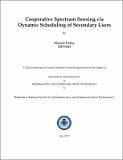Please use this identifier to cite or link to this item:
http://drsr.daiict.ac.in//handle/123456789/705| Title: | Cooperative spectrum sensing via dynamic scheduling of secondary users |
| Authors: | Pillutla, Laxminarayana Dubey, Mayank |
| Keywords: | Cognitive Radio Dynamic Spectrum Access Markov Decision Processes Optimal Filtering |
| Issue Date: | 2017 |
| Publisher: | Dhirubhai Ambani Institute of Information and Communication Technology |
| Citation: | Mayank Dubey(2017).Cooperative Spectrum Sensing via Dynamic Scheduling of Secondary Users.Dhirubhai Ambani Institute of Information and Communication Technology.VI, 35 P.(Acc.No: T00671) |
| Abstract: | "Spectrum sensing is a key function in cognitive radio to identify spectrum holes without interference to licensed/primary users (PUs). To overcome issues such as, multipath and shadowing co-operative spectrum sensing has been used which utilizes spatial diversity to improve detection performance. While we gain better detection performance, it can incur co-operation overhead. Overhead can occur due to secondary user (SU) usage cost and estimation cost. In this thesis, we shall consider the problem of secondary users’ selection for cooperative spectrum sensing in cognitive radio networks. We consider the optimal secondary user scheduling problem formulated as a infinite horizon Markov decision process (MDP). At each time instant, the scheduler can dynamically select subset out of a finite number of SUs, and record noisy observations of PUs evolving as a Markov chain over channels. The aim is to compute the optimal SUs scheduling policy in long run, so as to minimize a cost function comprising of channel state estimation errors, and SU usage costs. SU usage cost can be power required by a particular SU for sensing when scheduled for sensing in cost which incurs on system. Estimation cost is due to probability of error in correct estimation of system state. In the end, we compare our policy with a greedy policy where all SUs are scheduled at each instant with respect to cost. We show that on an average for a long term dynamic scheduling policy will reduce overall cost by 20 to 30 % compared to greedy policy." |
| URI: | http://drsr.daiict.ac.in//handle/123456789/705 |
| Appears in Collections: | M Tech Dissertations |
Files in This Item:
| File | Description | Size | Format | |
|---|---|---|---|---|
| 201511043.pdf Restricted Access | 201511043 | 495 kB | Adobe PDF |  View/Open Request a copy |
Items in DSpace are protected by copyright, with all rights reserved, unless otherwise indicated.
